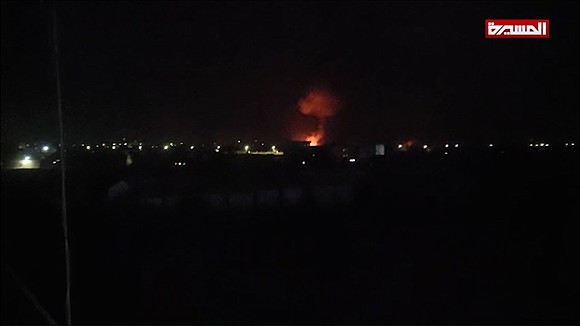Oil prices rise as US-led strikes in Yemen raise fears of wider conflict
1/12/2024, 10:43 a.m.

Originally Published: 12 JAN 24 07:03 ET
Updated: 12 JAN 24 11:36 ET
By Matt Egan, CNN
New York (CNN) — US-led airstrikes on Houthi targets in Yemen rattled energy markets on Friday, sending oil prices sharply higher.
US crude climbed as much as 4.5% to $75.25 a barrel Friday morning. Brent crude, the world benchmark, jumped 4% and briefly crossed over the $80-a-barrel level.
However, both oil contracts pared their gains significantly and by midday were only up about 2%.
That volatility underscores the risk of price spikes affecting consumers and businesses because of the deteriorating security situation in the Middle East.
Oil prices rose sharply after US-led strikes on multiple Houthi targets in Yemen in response to repeated attacks on commercial shipping in the Red Sea. The strikes on Iran-backed Houthis raise the specter of a regional conflict that could derail oil supplies from the Middle East.
“The chance of dragging multiple oil producing countries into the conflict is definitely higher today than it was yesterday. And it was higher yesterday than the day before,” said Robert Yawger, vice president of energy futures at Mizuho Securities.
Another concern is that oil facilities in Saudi Arabia could get hit by a retaliatory strike from the Houthis. In 2019, roughly 5% of world oil supply was briefly knocked offline in a large-scale drone attack on Saudi oil facilities.
“Once you start hitting facilities on land in Yemen, that is taking things to the next level,” Yawger said.
Despite Friday’s gains, oil prices remain lower than where they were before the October 7 attacks by Hamas against Israel due to concerns about oversupply.
John Kirby, the coordinator for strategic communications at the White House National Security Council, told CNN’s Becky Anderson on Friday that US officials know “people are anxious about escalation – we are too.”
“Everything we’re doing, everything we’re trying to do, is to prevent any further escalation,” Kirby said.
Prices initially climbed sharply on Thursday after Iran seized an oil tanker in the Gulf of Oman. However, those gains later faded as attention refocused on the fundamentals.
“There is a battle underway from day to day at the moment between fundamentals and geopolitics,” Matt Smith, lead oil analyst at Kpler, said in an email. “The fundamental backdrop is seasonally weak…but on the flipside we have ongoing concerns and incidents in the Red Sea, and now close to the Strait of Hormuz, two of the biggest maritime chokepoints in the world.”
Helima Croft, head of global commodity strategy at RBC Capital Markets, told clients in a note on Friday that many energy investors are in “show-me mode” after having been burned by fears about Russian supply disruptions in 2022 that failed to pan out.
Still, Croft, a former CIA analyst, warned there is a “very real risk” to energy facilities in the region if Iran decides to directly enter the conflict and suggested oil prices have room to rise sharply if the situation escalates further.
“The current price does not reflect the contagion risk for oil as well as Iran’s well-demonstrated disruptive capabilities and willingness to internationalize the costs of a confrontation,” Croft wrote.
The-CNN-Wire








